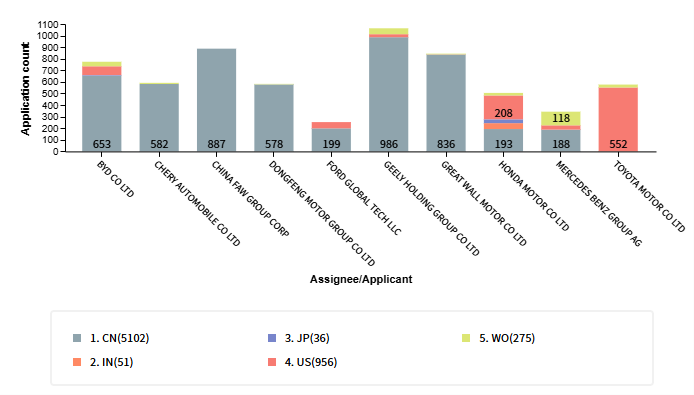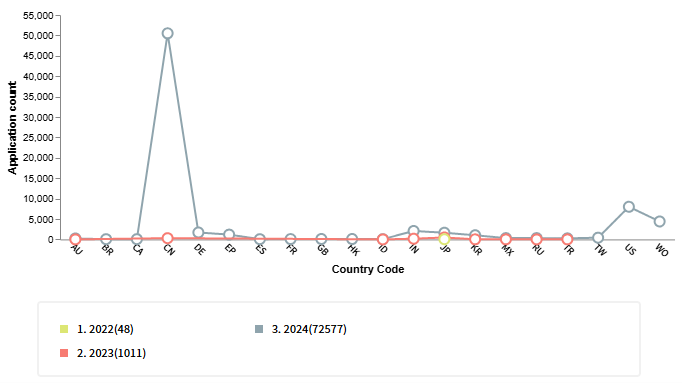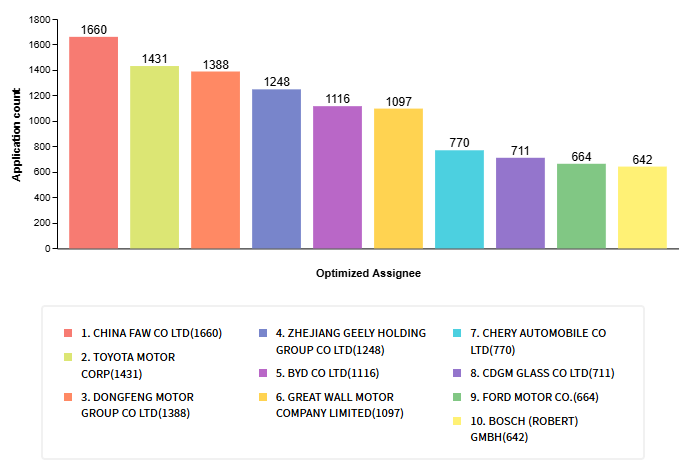Patents and IP Trends Transforming the Automotive Industry
The future of transportation has arrived, with the automotive industry at the forefront of an era defined by pioneering advancements and an unwavering pursuit of innovation. In this dynamic landscape, where carmakers, technology leaders, and service providers converge, a transformation is underway. As the sector accelerates toward goals of sustainability, safety, and efficiency, it is paving the way for a more intelligent, eco-friendly, and seamlessly connected world.
The automotive industry is driving through a profound technological shift, with intellectual property (IP) trends serving as essential gears in shaping its future. As the pace of innovation surges, automakers are aligning with evolving consumer demands, strategically navigating complex patent landscapes, and tackling a new wave of industry challenges. A closer examination reveals pivotal IP trends, from evolving patent filing patterns and core technology clusters to breakthrough innovations that are redefining the future of transportation.
The historical relationship between patent holders and automobile manufacturers
The historical relationship between patent holders and automobile manufacturers has generally been positive concerning intellectual property matters. Patent suppliers have often hesitated to enforce their patent rights against car manufacturers, recognizing that such actions could jeopardize ongoing business relationships and lead manufacturers to source alternative products. Consequently, automobile manufacturers have largely remained shielded from patent infringement litigation.
Patent Filing Trends in US Automotive Industry in past year

Source: Derwent Innovation
In total, 73,970 patent applications were published till date. In November and December of 2023, a total of 1,071 applications were published. By November 2024, the total number of published applications had reached 72,899. This represents a significant increase, highlighting a rising trend in the number of patent applications being published.
Top countries by assignee

Source: Derwent Innovation
China leads in the number of patents published in the automotive sector, with a count of 5,102 over the past year. The United States follows with 956 patents. This data establishes China as the global leader in automotive patent applications.
Top countries by year

Source: Derwent Innovation
The automotive industry has witnessed a marked surge in patent applications in 2024, signalling a growing emphasis on intellectual property within the sector. In 2022, 48 patent applications were filed, which increased significantly to 1,011 in 2023. This upward trend has continued sharply in 2024, with a substantial rise to 72,577 applications. This notable growth highlights the increasing importance of patents as a strategic asset in the automotive industry, underscoring the sector’s commitment to innovation and technological advancement.
Top optimized Assignees

Source: Derwent Innovation
The highest number of patent assignees in the automotive industry over the past year is led by China FAW Co., Ltd., with 1,660 patents. Toyota Motor Corporation follows closely with 1,431 patents. In contrast, Bosch has assigned a comparatively lower number of patents, totalling 642. This distribution underscores the active role of leading automotive companies in securing intellectual property and advancing innovation within the industry.
Total Filings in USPTO, EPO, JPO, etc. in the past year
In the past five years, the total number of patent filings related to Automotive industry across various patent offices is as follows:
China (CN): 53485 filings
United States of America (US): 8209 filings
Japan (JP): 2493 filings
India (IN) : 2245 filings
Germany (DE) : 1698 filings
European Patent Office (EPO): 1234 filings
Republic of Korea (KR): 1097 filings
Source: Derwent Innovation
These filings indicate a substantial increase in the number of patents within the automotive industry, reflecting considerable innovation and growth in this sector. This trend highlights the industry’s dynamic advancements and the ongoing commitment to technological development.
Iconic Legal Battles That Shaped the Automotive Industry
Analysing the Ford-Selden Patent Battle Lessons on Innovation, IP Law, and the Balance of Patent Power in the Automotive Industry
The Ford-Selden case is a pivotal example of how IP rights shape industry landscapes. It highlights the importance of balancing patent protection with industry-wide access to fundamental technologies. The positive outcome here shows that innovation can thrive when patents do not overreach, fostering both technical progress and public accessibility. Ford’s success in court not only impacted his company’s future but also underscored the role of IP law in ensuring that genuine invention benefits society.
However, the case also revealed potential pitfalls within the IP system, such as the risk of patents being used to limit competitors rather than to protect true innovation. This insight remains relevant today as modern industries, especially in tech, navigate similar patent disputes. Ultimately, the Ford-Selden case reminds us that while patents are vital in safeguarding innovation, they must be applied with a fair and practical scope to genuinely advance industry and society.
Positive Implications
Ford-Selden patent battle include fostering innovation and competition within the automotive industry by allowing companies to operate independently, leading to advancements like the assembly line. It also benefited consumers by making cars affordable, revolutionizing transportation and contributing to economic growth. The court’s ruling limited patent monopolies, ensuring patents advance technology rather than stifle it, and helped establish modern IP litigation standards, balancing protection of innovation with the need to encourage progress.
Potential Challenges
Ford-Selden case highlight significant challenges in intellectual property law. The lengthy and expensive litigation burdened smaller innovators, making it difficult for them to contest patent claims. The control over the Selden patent initially delayed innovation and market entry, while the risk of patent trolling—using patents without intent to innovate—became evident. Additionally, the case showcased the challenges in defining patent scope, leading to complex and unpredictable legal battles.
Impact on Stakeholders
The Ford-Selden patent dispute had significant impacts on stakeholders in the automotive industry. Automakers like Ford gained the freedom to innovate and reduce production costs, leading to more affordable cars for consumers. However, smaller companies faced financial and legal difficulties in challenging patent claims, often unable to compete with larger, established players. The Selden patent holders benefitted financially during the legal battle but eventually faced public and legal pushback for monopolizing broad ideas. The case also shaped modern intellectual property law, highlighting the need for clearer patent definitions and a balance between innovation protection and patent abuse.
Source: https://www.jdsupra.com/legalnews/the-top-ten-patent-wars-automobiles-3-41099/
Conclusion:
As the automotive industry shifts into high gear toward a future defined by electric, autonomous, and connected vehicles, patents are becoming the fuel that drives innovation and competition. The record-high patent filings across global players highlight a race not just to develop new technologies but to shape the very roadmaps for tomorrow’s transportation.
Through patents, companies are securing their place in this next chapter, where each filing represents a new idea, a fresh solution, or a step closer to a more sustainable, efficient, and safe way of getting around. This new era of automotive evolution brings with it the lessons of past IP battles, like the landmark Ford-Selden case, reminding us of the delicate balance between protecting innovation and enabling industry-wide progress.
From pioneering tech giants to up-and-coming startups, every player in the industry now faces a unique moment: a chance to leverage intellectual property as both shield and compass. This shift isn’t just about safeguarding ideas—it’s about unlocking new possibilities, driving sustainable change, and ultimately redefining how we move. The future of the automotive industry is bright, and it is patents that will continue to ignite its way forward.
At Legal Advantage, we specialize in supporting patent filings and guiding clients through the complex intellectual property landscape that defines the automotive industry. Our dedicated team is committed to protecting innovations that are shaping the future of transportation, from electric vehicles and advanced battery systems to connected and autonomous technologies. Through our comprehensive consultation and strategic patent services, we empower inventors and organizations to secure their automotive breakthroughs, ensuring that their intellectual property contributes meaningfully to a safer, more sustainable, and technologically advanced mobility landscape.


